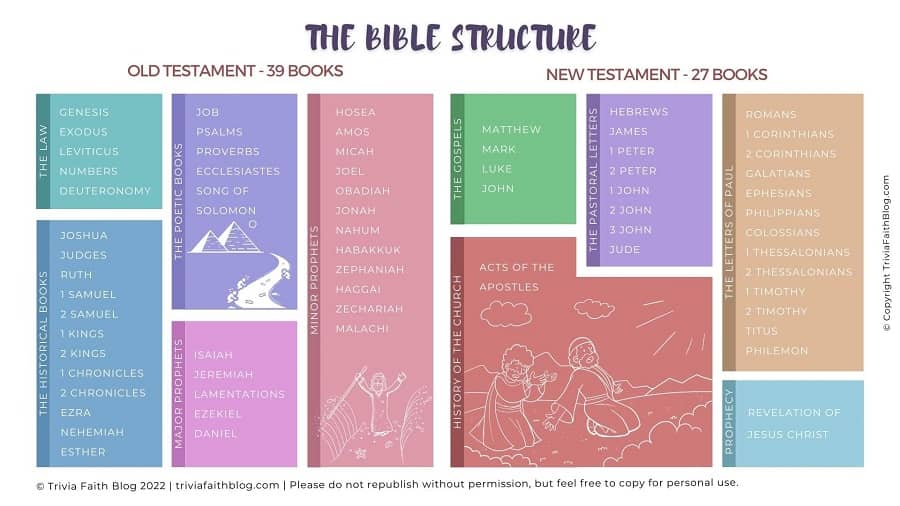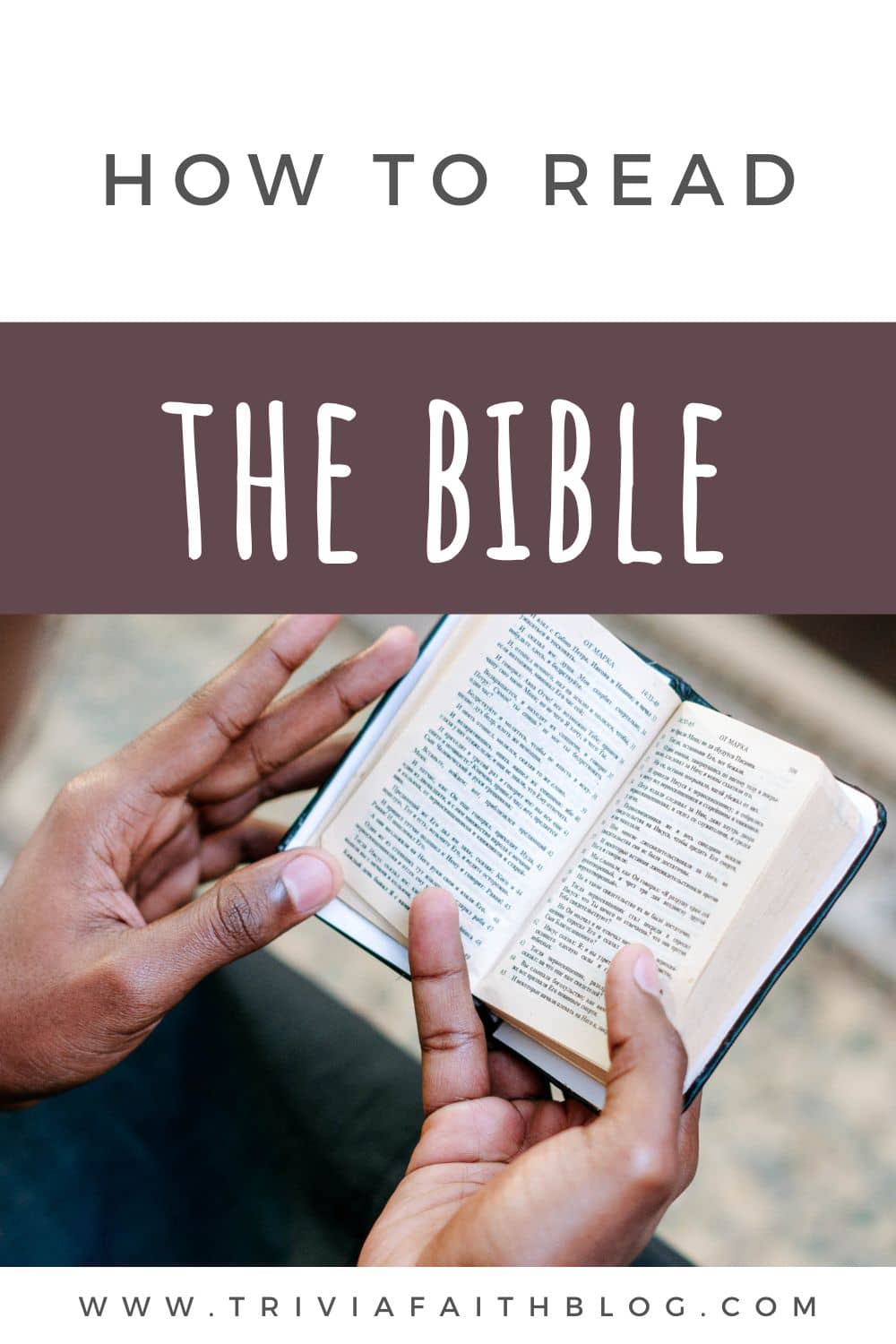13 How To Study The Bible Effectively For Beginners
The Bible is God's inspiration, and we must study it daily. It is full of wisdom and guidance that we need in our lives.
However, many people find reading the Bible hard because they do not know where to start. So, we have compiled a list of easy steps to help you get started on your bible reading journey.
In this article, we will be looking at How To Study The Bible Effectively For Beginners. We pray that this post will help you and that you will find studying the Bible a joyous and rewarding experience.
See also: How To Get Right With God Bible Verses
- Structure Of The Bible
-
How To Study The Bible Effectively For Beginners
- 1. Get a bible that is easy for you to read.
- 2. Find a quiet place to study the Bible.
- 3. Pray before you start reading.
- 4. Read for understanding, not just for information
- 5. Read with a study bible or commentary
- 6. Join a bible study or small group
- 7. Read the whole Bible
- 8. Read for application
- 9. Read with worship and thanksgiving
- 10. Read regularly
- 11. Use other resources
- 12. Use Bible Apps and Websites
- 13. Don't give up
- The Best Order To Read The Bible
- How To Study The Bible Effectively For Beginners PDF
- Conclusion
- Prayer For the Word Of God
- Free Printable Books Of The Bible Chart Structure
Structure Of The Bible

The Bible is divided into both the old and new testaments.
The Old Testament
The Old Testament contains the books written before Jesus was born. It starts with the world's creation and ends with the promised coming of the Messiah (Jesus).
The old testament is divided into:
- The book of Law contains the books of Genesis, Exodus, Leviticus, Numbers, and Deuteronomy.
- The book of History contains the books of Joshua, Judges, Ruth, 1 & 2 Samuel, 1 & 2 Kings, 1 & 2 Chronicles, Ezra, Nehemiah, and Esther.
- The book of Wisdom contains the books of Job, Psalms, Proverbs, Ecclesiastes and the Song of Solomon.
- The book of Prophecy contains the books of Isaiah, Jeremiah, Lamentations, Ezekiel, Daniel, Hosea, Joel, Amos, Obadiah, Jonah, Micah, Nahum, Habakkuk, Zephaniah, Haggai, Zechariah, and Malachi.
The New Testament
The books in the New Testament were written after Jesus was born. It starts with the birth of Jesus and ends with His return.
The new testament is divided into:
- The book of Gospels contains the books of Matthew, Mark, Luke, and John.
- The book of Acts tells the story of the early church after Jesus' ascension.
- The book of Epistles are letters written by the apostles to churches and individuals.
- The book of Revelation is a prophetic book that describes the end times.
How To Study The Bible Effectively For Beginners
1. Get a bible that is easy for you to read.
There are many different versions of the Bible, and it can be confusing to choose one. We recommend getting a simple bible like the English Standard Version (ESV) or the New International Version (NIV) if you are just starting.
There are other numerous translations of the Bible text; this includes New Living Translation (NLT) and New King James Version (NKJV). These versions are also easy to understand and will help you start your Bible reading journey.
"For the word of God is living and active, sharper than any two-edged sword, piercing to the division of soul and of spirit, of joints and of marrow, and discerning the thoughts and intentions of the heart." - Hebrews 4:12
2. Find a quiet place to study the Bible.
Reading the Bible is a personal experience between you and God. It is important to find a place where you can have some quiet time to help you focus on what you are reading.
If you have trouble focusing at home, try going to a local coffee shop or library. Some people even like to read outside in the garden if you have one.
"But when you pray, go into your room and shut the door and pray to your Father who is in secret. And your Father who sees in secret will reward you." - Matthew 6:6
3. Pray before you start reading.
One way to get your heart in the right mindset for Bible reading is by prayer. Pray before you start, and then find some peaceful time where there aren't any distractions so that every single word can be absorbed into yourself fully.
Prayer is a two-way conversation between the man and God. So be sure to listen when God talks with you. He might use the Bible reading for something specific that's been bothering or troubling you ever since childhood.
"If any of you lacks wisdom, let him ask God, who gives generously to all without reproach, and it will be given him." - James 1:5
"Open my eyes, that I may behold wondrous things out of your law." - Psalm 119:18
4. Read for understanding, not just for information
When you read the bible, it is important to pay attention to what you are reading. Try understanding what the passage says and how it applies to your life.
Don't just read to get through the pages; take time to ponder what you have read. You can even journal your thoughts and how the bible verses apply to you.
"Study to shew thyself approved unto God, a workman that needeth not to be ashamed, rightly dividing the word of truth." - 2 Timothy 2:15
5. Read with a study bible or commentary
If you want to go deeper in your understanding of the bible, we recommend using a study bible or commentary. These resources can help you understand the historical context and culture of the bible.
Commentaries can also give you insights into how to apply the bible verses to your life. Be sure to choose resources that reputable scholars have written.
"All Scripture is God-breathed and is useful for teaching, rebuking, correcting and training in righteousness, so that the servant of God may be thoroughly equipped for every good work." - 2 Timothy 3:16
6. Join a bible study or small group
One of the best ways to grow in your understanding of the Bible is to join a bible study or small group. You can discuss what you are learning with other Christians in these groups.
You can also ask questions and get help when struggling to understand something. These groups can provide accountability and encouragement as you read the bible.
"And let us consider how to stir up one another to love and good works, not neglecting to meet together, as is the habit of some, but encouraging one another, and all the more as you see the Day drawing near." - Hebrews 10:24-25
7. Read the whole Bible

When you start reading the bible, aim to read the entire bible. Though you might not be able to do this all at once, reading through the entire bible will give you a better understanding of God's Word.
If you need help knowing where to start, then see below the best order to read the bible. You can also use a reading plan to help you read through the bible in a year.
"Sanctify them in the truth; your word is truth." - John 17:17
8. Read for application
As you read God's Word, think about how the verses apply to your life. What is God trying to say to you through His Word?
The bible is not just a book of history or a collection of bible stories; it is a living and active word that can transform your life.
You can ask yourself questions like:
- What does this passage teach me about God?
- How does this passage challenge me to change?
- What sin do I need to confess based on this passage?
- What promises can I claim from this passage?
"Do not merely listen to the word, and so deceive yourselves. Do what it says." - James 1:22
9. Read with worship and thanksgiving
As you read the bible, take time to worship God for who He is and what He has done. Give thanks for His goodness, mercy, and love.
Let the bible reading be a time where you focus on God and grow in your love for Him. Thank Him for how He is working in your life through His Word.
"Oh come, let us worship and bow down; let us kneel before the LORD, our Maker! For he is our God, and we are the people of his pasture, and the sheep of his hand." - Psalm 95:6-7
10. Read regularly
Reading God's Word daily is one way to grow your understanding of the Bible. Set aside time each day or week to read God's Word.
Make it a priority to regularly read and study the bible. The more you read, the more you will understand and apply it to your life.
"But his delight is in the law of the LORD, and on his law he meditates day and night." - Psalm 1:2
11. Use other resources

In addition to reading the bible, other great resources can help you understand it better. Here are a few suggestions:
- Read books on the bible and theology
- Listen to podcasts on the bible
- Watch videos on the bible
- Study biblical languages
- Have a bible reading plan handy
All of these resources can help you grow in your understanding of God's Word.
"I have stored up your word in my heart, that I might not sin against you." - Psalm 119:11
12. Use Bible Apps and Websites
Many different bible apps and websites can help you read and study the Bible. These resources can provide commentary, reading plans, and other tools to help you navigate difficult passages.
My favorite bible app is YouVersion. This app is available for both iPhone and Android devices. YouVersion has various bible reading plans, audio bible, daily reading scripture, and access to various bible translations to help you grow in your understanding of God's word.
"Your word is a lamp to my feet and a light to my path." - Psalm 119:105
13. Don't give up
When you start reading the Bible, you might not understand everything you read. Don't get discouraged or give up.
Keep reading and studying God's Word. As you read more, the Holy Spirit will help you to understand what you are reading.
"And we also thank God constantly for this, that when you received the Word of God, which you heard from us, you accepted it not as the word of men but as what it really is, the Word of God, which is at work in you believers." - 1 Thessalonians 2:13
The Best Order To Read The Bible
Below is a simple and easy way to read an entire book of the Bible in a year. You can start reading at any time, but the beginning of the year is a great time to start afresh.
- January: The four Gospels (Matthew-John)
- February: The History of The Church (Acts of the Apostles)
- March: Paul's Letters to the Churches (Romans-2 Thessalonians)
- April: Paul's letters to Individuals (1 Timothy-Philemon)
- May: The General Epistles (Hebrews-Jude)
- June: The Book of Law (Genesis-Deuteronomy)
- July: The Wisdom Books (Job-Song of Songs)
- August: The Historical Books (Joshua-Esther)
- September: The Prophecies (The Book Of Revelation)
- October: The Major Prophets (Isaiah-Daniel)
- November: The Minor Prophets (Hosea-Malachi)
- December: Time of Reflection
The above list is just one way to read the entire Bible in a year. If you want to mix things up, feel free to switch around the order of the books.
You can also pick up a chronological Bible to read through the events of Scripture in the order they happened.
No matter how you choose to read through the bible, the important thing is to just keep reading regularly. The more you read, the more you will understand and be able to apply God's Word to your life.
How To Study The Bible Effectively For Beginners PDF
Conclusion
Studying God's Word is a great way to grow in faith and to know more about Him. Always have faith, trust in God, and never give up.
Studying the Bible for the first time might look challenging, but I promise you, it's easy to read and understand if you read it wholeheartedly.
Prayer For the Word Of God
In the name of our Lord Jesus Christ, I bind myself to the reading of Scripture to grow in the knowledge and wisdom of God. I pray that as I read His Word, the Holy Spirit would open my eyes to see things I have never seen before and give me an understanding of things I have never understood.
I pray that I will be diligent in my studies and not grow weary in well-doing. I pray that my love for the Word of God would increase daily and that I would have a greater hunger and thirst for righteousness.
I pray that the Your Word would dwell richly in me and that the renewal of my mind would transform me. I pray that I would be obedient to what I read and that I would not just hear the Word but also do it.
I pray that as I study the Bible, I will be filled with hope, and my faith will increase. I pray that I grow in humility and love and become more like Christ daily. Amen.
Free Printable Books Of The Bible Chart Structure

We hope that this topic has blessed you. Comment below on how the topic helped you to begin reading the Bible and its impact on your life.
See also: Powerful Prayers in the Bible
Pin this!


Related Posts